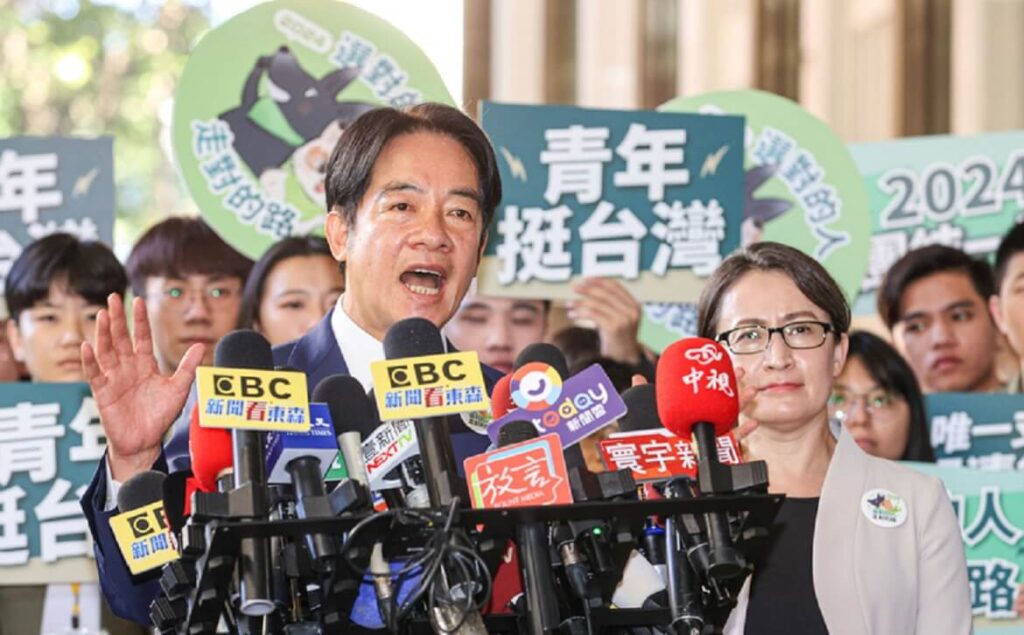World Geostrategic Insight interview with Prof. dr. h.c. Hei Sing Tso on the significance of Taiwan’s 2024 presidential election in the background of the U.S.-China rivalry.

Hei Sing Tso is a political commentator on Hong Kong, Taiwan, China and international affairs; Independent researcher, Fiction writer; Lawyer at Tso & Associates; Expert and Consultant on Stratagem and Connections, author of the book “I Ching & 36 Tricks – Your Personal Wisdom Manual”.
Q1 – On January 13, Taiwan will hold presidential and parliamentary elections, closely watched by the international community, especially Beijing and Washington, at a time when tensions across the Strait, and in US-China relations, are at their highest level in years. As with every election in Taiwan, the most crucial question is always that of relations between Taiwan and China.
Taiwanese voters will choose between Democratic Progressive Party (DPP) candidate Lai Ching-te (賴清德), Kuomintang (KMT) candidate Hou Yu-ih (侯友宜), and Taiwan People’s Party (TPP) candidate Ko Wen-je (柯文哲).
Of the three candidates, polls give a narrow lead to the representative of the ruling Democratic Progressive Party (DPP), current vice-president Lai Ching-te. He takes a hard line on Beijing. He is followed by Kuomintang (KMT) candidate Hou Yu-ih, who is more in favor of dialogue with the People’s Republic of China.
According to Taiwanese intelligence services, Hou Yu-ih enjoys discreet but active behind-the-scenes support from the Chinese government. For its part, the United States has called on China not to “interfere” in Taiwan’s presidential election. Is Beijing deploying a sophisticated strategy to influence the outcome of these elections?
A1 – It is normal for Beijing to deploy a strategy toward Taiwan, but I do not think it is a complex and sophisticated strategy. Intervention by aggressive and covert means is not the best option. First, the KMT is not at all willing and does not need to secretly collude with Beijing. Second, if any covert interventions and agreements are discovered, it will mean that the KMT has completely lost its independence, which would not be accepted by the people of Taiwan at all.
However, Beijing is adopting some propaganda tactics, such as broadcasting open messages to help the KMT in the air. China would like to show that the KMT is able to communicate peacefully with the CCP, so as to avoid cross-strait tensions. This is a subtle type of political warfare. In Chinese stratagem, sometimes inaction is better than action.
Q2 – Although Taiwanese society is increasingly asserting its national identity, it remains largely tied to the status quo with Beijing (neither independence nor unification). Above all, it seems that Taiwanese public opinion lately is leaning more toward peaceful relations with China, perhaps partly as a result of the large military exercises conducted by China in the Straits in reaction to Nancy Pelosi’s visit to Taiwan, and thus out of fear of the outbreak of war. Could this shift in public opinion also affect the future ruling party’s stance on cross-strait relations? The DPP is traditionally seen as a party that resists China, but after this election, if it wins, could it make any changes to its policy?
A2 – There are two factors to consider. First, the shocking effects of the conflict between Russia and Ukraine, and of the Israel-Hamas war, have strengthened the desire for peace and harmony among the majority of the Taiwanese people, especially the young voters, who prefer economic recovery to tension with China. Most Taiwanese do not like being ruled by Beijing, but that does not mean they want to go to war with China.
Second, if the United States will need China’s help to solve global problems, such as mediating conflicts in the Middle East or even in Europe, Biden or the next administration will make concessions. Once U.S.-China tensions will ease, even if the DPP wins, it will change its hardline policy.
Q3 – Over the past year and a half, China has intensified its military incursions off the Taiwanese coast and remains determined to reunify Taiwan, preferably by peaceful means, but also “by force if necessary.” The United States, for its part, stands by the status quo on the island, which for Washington has been the guarantor of peace in recent decades. What future lies ahead for Taiwan?
A3 – In essence, China will not resort to unification of Taiwan by military force unless two events occur: (01) Taiwan proclaims independence and (02) Taiwan is invaded by foreign nations.
The grand strategy of the Chinese leadership is to have a stable and peaceful environment for its One Belt One Road (BRI) initiative. For this reason, Beijing always wants to act as a mediator for the peaceful resolution of global conflicts.
The use of force against Taiwan is totally contrary to these strategic goals. However, peace across the Taiwan Strait cannot be totally immune from the turbulence of global geopolitics. If a crisis is not handled properly by the parties involved, tensions can escalate and spiral out of control.
The Taiwan issue will continue to be a key pawn in the chess game between China and the United States for the foreseeable future. If Washington needs Beijing’s cooperation, Taiwan will remain stable. Conversely, amid a U.S.-China clash, Taiwan will be in trouble.
Prof. dr. h.c. Hei Sing Tso – Political Commentator, Lawyer, Expert and Consultant on Stratagem and Connections, author of the book “I Ching & 36 Tricks – Your Personal Wisdom Manual“.
Image Credit: CNA







